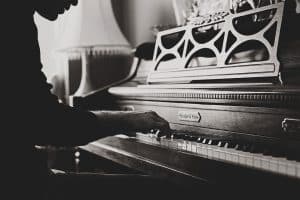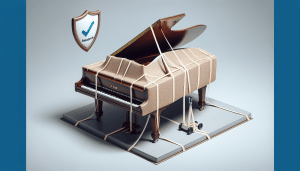Contents
Introduction
Welcome to our blog post on piano maintenance during storage. If you’re looking for ways to protect your beloved piano while it’s not in use, you’ve come to the right place. In this article, we’ll discuss the importance of proper piano maintenance during storage and provide you with valuable tips to prevent damage. Whether you’re moving, renovating, or temporarily downsizing, taking care of your piano during storage is crucial to ensure its longevity and preserve its beautiful sound.
Why Piano Maintenance During Storage is Important
Storing a piano without proper maintenance can lead to various issues such as damage to the internal components, warping of the wood, and changes in the overall tone and pitch. To avoid these problems, it’s essential to give your piano the attention it deserves before placing it in storage.
How to Prepare Your Piano for Storage
Before moving your piano into storage, there are several steps you should take to prepare it properly:
- Clean the piano: Dust and dirt can accumulate on the surface and inside the piano over time. Use a soft cloth to gently remove any dust, and consider using a piano-specific cleaner for optimal results.
- Remove accessories: Take off any detachable accessories, such as the music stand or bench, and store them separately to prevent them from scratching or damaging the piano.
- Close the lid: Lower the lid of your piano to protect the keys and internal components from dust and potential damage.
- Secure the keys: Use a piece of cloth or a piano key lock to keep the keys from moving during transportation and storage.
- Consider professional help: If you’re uncertain about the process or want to ensure the best care for your piano, hiring professional piano movers who specialize in storage is a wise decision.
Choosing the Right Storage Environment
When it comes to piano storage, the environment plays a crucial role in preventing damage. Here are some factors to consider when selecting a storage facility:
- Temperature control: Extreme temperatures can harm your piano, so choose a storage unit with climate control. The ideal temperature range for piano storage is between 65°F and 75°F (18°C and 24°C).
- Humidity levels: Excessive humidity can cause the wood to swell and warp, while low humidity can lead to cracking. Aim for a humidity level of around 42% to 50% to maintain the piano’s condition.
- Protection from sunlight: Direct sunlight can fade the piano’s finish and cause the wood to deteriorate. Ensure the storage space is shielded from direct sunlight to preserve the piano’s appearance.
Proper Piano Placement and Positioning
When placing your piano in storage, keep the following tips in mind:
- Avoid uneven surfaces: Ensure that the piano rests on a level and stable surface to prevent it from tipping over or becoming unbalanced.
- Maintain proper spacing: Leave enough room around the piano to avoid any potential collisions with other items or walls.
- Protect the piano legs: Consider using padded materials or piano leg covers to prevent scratches or damage to the legs during storage.
- Temperature control: Extreme temperature variations can lead to warping, expansion, and contraction of the piano’s components. It’s important to choose a storage unit with climate control to ensure a stable temperature within the recommended range.
- Humidity control: Excess humidity can cause the wood to swell, affecting the structural integrity of the piano. On the other hand, low humidity levels can result in shrinking and cracking. Using a humidifier or dehumidifier, depending on the local climate, can help maintain the ideal humidity range for your piano.
Regular Inspection and Cleaning
Even when in storage, your piano requires regular attention to keep it in optimal condition. Here are some key maintenance tasks you should perform:
- Scheduled inspections: Visit your stored piano periodically to check for any signs of damage, pests, or changes in its condition. Inspect the keys, strings, and overall structure. If you notice any issues, address them promptly to prevent further damage.
- Cleaning routine: Dust and debris can accumulate on your piano even while in storage. Use a soft cloth to gently remove dust from the surface, keys, and pedals. Avoid using harsh chemicals or abrasive materials that could harm the piano’s finish.
Frequently Asked Questions
- Can I store my piano upright?
Yes, storing your piano upright is generally acceptable, as long as it is placed on a stable surface and properly secured to prevent it from toppling over.
- Should I cover my piano during storage?
It’s advisable to cover your piano with a breathable piano cover or a large sheet to protect it from dust and potential scratches. Ensure that the cover allows proper ventilation to prevent humidity buildup.
- Is it necessary to tune my piano before storing it?
It’s recommended to have your piano tuned before placing it in storage. This ensures that it is in optimal condition and minimizes the risk of the strings losing tension or going out of tune during storage.
- How often should I inspect my stored piano?
It’s ideal to inspect your stored piano at least once every three to six months. Regular inspections allow you to catch any potential issues early on and take necessary measures to prevent further damage.
- Can I move my piano while it’s in storage?
Moving a piano while it’s in storage is not recommended. Pianos are delicate and require proper handling and care during transportation. If you need to move your piano, consult professional piano movers who specialize in storage and transportation.
Conclusion
Proper piano maintenance during storage is essential to prevent damage and preserve the instrument’s longevity. By following the guidelines we’ve provided in this article, you can ensure that your piano remains in excellent condition while not in use. Remember to clean it regularly, choose a suitable storage environment with temperature and humidity control, and conduct periodic inspections. If you’re unsure about any aspect of piano storage, don’t hesitate to seek professional assistance.
At Utah Piano Movers, we understand the importance of protecting your valuable instrument. Contact us at 801-396-7323 or visit our website www.utahpianomovers.com to learn more about our piano moving and storage services. Trust us to handle your piano with utmost care and expertise. Preserve the beauty and sound of your piano by ensuring proper maintenance during storage.




